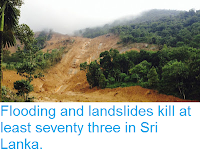At least 91 people have died and over 110 are missing after heavy rain triggered flooding and mudslides across central, western and southern parts of the country on Thursday 25 and Friday 26 May 2017. The worst incident occured in Bulathsinhala District in Western Province, where at least eleven people are known to have died in a single mudslide, while 38 people are reported to have died in flooding in Kalutara District in Central Province and 46 in Ratnapura District in Southern Province. Landslides
are a common problem after severe weather events, as excess pore water
pressure can overcome cohesion in soil and sediments, allowing them to
flow like liquids. Approximately 90% of all landslides are caused by
heavy rainfall.
The aftermath of a landslide in the village of Bellana in Kalutara District, Sri Lanka, on 26 May 2017. Eranga Jayawardina/AP.
Eranga Jayawardena
Eranga Jayawardena
Eranga Jayawardena
Eranga Jayawardena
Eranga Jayawardena
The
rains are associated with the onset of the Sri Lankan summer monsoon,
which lasts from May to October, typically brining around 400 mm of rain
to many parts of the country in an average year. Monsoons
are tropical sea breezes triggered by heating of the land during the
warmer part of the year (summer). Both the land and sea are warmed by
the Sun, but the land has a lower ability to absorb heat, radiating it
back so that the air above landmasses becomes significantly warmer than
that over the sea, causing the air above the land to rise and drawing in
water from over the sea; since this has also been warmed it carries a
high evaporated water content, and brings with it heavy rainfall. In the
tropical dry season the situation is reversed, as the air over the land
cools more rapidly with the seasons, leading to warmer air over the
sea, and thus breezes moving from the shore to the sea (where air is
rising more rapidly) and a drying of the climate.
Diagrammatic representation of wind and rainfall patterns in a tropical monsoon climate. Geosciences/University of Arizona.
See also...
Follow Sciency Thoughts on Facebook.





